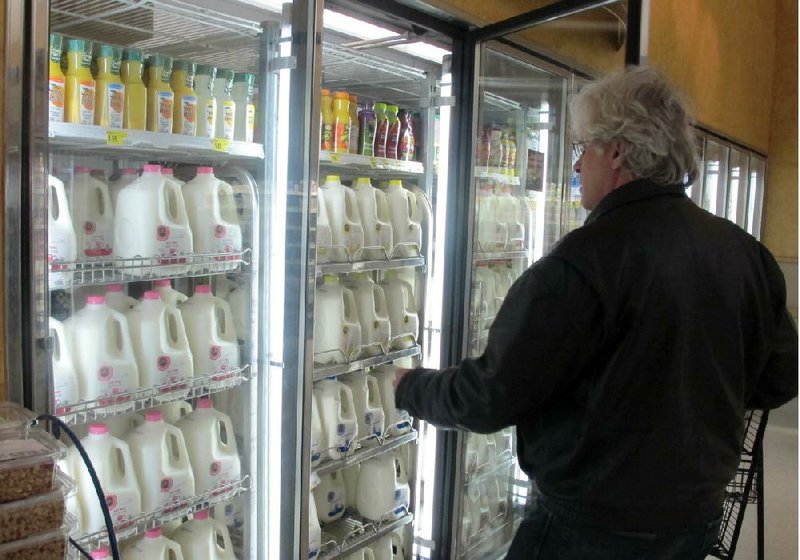WASHINGTON — White House and congressional bargainers agreed Monday to prevent milk-price increases as part of their compromise to avert the “fiscal cliff.”
Senate Agriculture Committee Chairman Debbie Stabenow, D-Mich., said negotiators agreed to extend portions of the expired farm bill through September. She said that includes language keeping milk prices from potentially doubling, but excluding other provisions, including energy and disaster aid for farmers.
Stabenow said she considers the extension to be “Mitch McConnell’s version of a farm bill.” She was referring to the Senate minority leader from Kentucky, who she said forced bargainers to accept the version of the farm bill that appeared in the deal.
Stabenow and House Agriculture Committee Chairman Frank Lucas had backed a short-term extension that would have extended current law, along with disaster aid for producers affected by this year’s U.S. drought and changes to current milk policy, through Sept. 30. It would have reduced mandatory outlays by $30 million through fiscal 2022, according to the Congressional Budget Office. The bulk of the spending would have come in the first year, and as such, it would actually have increased spending by an estimated $555 million through fiscal 2017.
“We need to take positive action, put this issue to rest, and make sure that it is clear to everybody in this country that the farm bill policy has certainty and that we will not have $8 or $9 milk,” Lucas had told reporters on Monday.
The Stabenow- and Lucas backed proposal was one of three farm-related draft bills released over the weekend in the House of Representatives; all of them would have staved off the potential jump in consumer milk prices had government commodity programs begun to lapse today.
The second measure, which the House has scheduled a vote on for today, would extend most of the current law through Jan. 31. It’s unclear if the House will pass the bill. It will be considered under a fast track procedure that requires a two-thirds vote.
Rep. Collin Peterson of Minnesota, the top Democrat on the House Agriculture Committee, called a 30-day extension a “poor joke on farmers that offers no certainty.”
The third measure would have protected only against possible dairy-price spikes. The second and third measures were opposed by House and Senate Democratic agriculture leaders.
The most recent farm law, enacted in 2008, expired after attempts to pass a new five year proposal failed. Without that plan, agricultural programs automatically return to rules passed in 1949, the basis of all subsequent legislation.
The effects of that transition have been delayed because of the growing seasons of different crops. Dairy production, a year-round business, is the first major commodity affected. In November, the U.S. Department of Agriculture put the price of a gallon of fresh whole milk at just under $3.54.
Under President Harry S. Truman’s farm policy, the government bought supplies of a product until its price reached “parity” with the cost immediately before World War I. Adjusted for a century of inflation, the Agriculture Department’s milk-support price today would be $39.08 per hundred pounds, more than double the dairy futures price of $18.60 at 8:34 a.m. in New York on Monday.
Under the revised dairy plan, written by Peterson, the government would have managed the milk supply by setting milk-production limits for farmers who enroll in a market-stabilization program. The proposal eliminated programs that pay farmers when prices fall below a certain level, replacing them with initiatives designed to protect profit margins through insurance programs and by limiting output, which would raise prices.
Oversupply of milk that drives down prices has been a perpetual difficulty for dairy producers. The National Milk Producers Federation, an organization of farmers and dairy cooperatives, had supported the plan, while the International Dairy Foods Association, which represents milk processors such as Dallas-based Dean Foods Co., had opposed it for potentially driving up the cost of their raw materials.
The market-stabilization plan was included in both the Senate’s 10-year, $1 trillion version of the farm bill it passed in June and a bill approved in July by the House Agriculture Committee but not taken up by the full chamber. It wasn’t in the 2008 farm law, which the one-year draft legislation would have extended - adding the new dairy program.
House Speaker John Boehner, an Ohio Republican, has called the current dairy program “Soviet-style” management of the farm economy that the Peterson plan would worsen.
The dairy language remained a sticking point, according to several Republicans, including Rep. Fred Upton of Michigan. They said Republican leaders had yet to decide whether to try to incorporate Peterson’s preferred dairy language - a change that would be key to winning support from the Democrats who had been following Peterson’s lead on this bill.
“We’re going to let the House work its will,” said Upton, who had predicted that “we’re going to be looking at a straight extension of the farm bill for the next nine months.”
Agriculture Secretary Tom Vilsack on Sunday had warned that without a new farm bill, consumers would pay the price.
“Consumers, when they go in the grocery store, are going to be a bit shocked when instead of seeing $3.60 for milk, they see $7 a gallon for milk,” he said on CNN’s State of the Union program. “That’s going to ripple throughout all of the commodities if this thing goes on for an extended period of time.”
Several House Republicans had said earlier on Monday that if an agreement were reached to deal with the larger tax and spending issues, the Senate could attach a one-year extension of the law, which funds food aid to poor families as well as subsidies to growers of corn, cotton and other crops.
“We’re mostly waiting for the Senate to see what they put together,” said Rep. Cathy McMorris Rodgers of Washington state, the fourth-ranking Republican in the House.
Information for this article was contributed by Heidi Przybyla of Bloomberg News.
Front Section, Pages 4 on 01/01/2013
